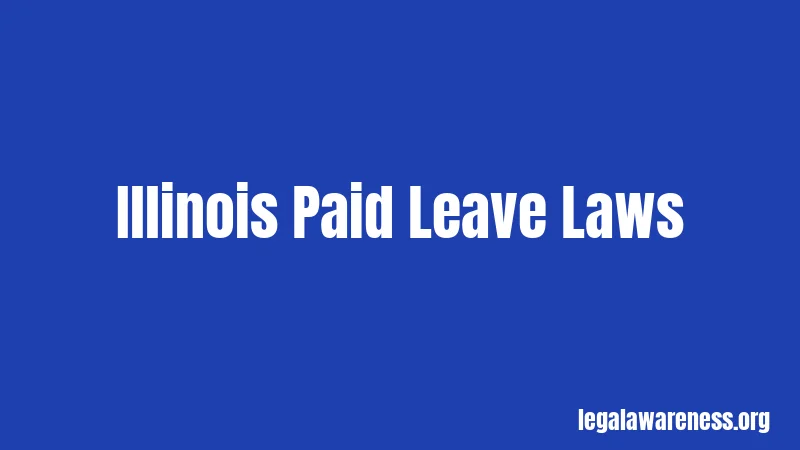Illinois PTO Laws in 2026: What Employers and Workers Need to Know
Most people don’t realize how confusing PTO rules actually are. Seriously. Illinois has some pretty specific laws about paid time off, and if you’re an employee or a manager, you need to understand them. The good news? We’re breaking it down into simple terms so you actually get it.
Here’s what you’ll learn: what PTO means in Illinois, when your employer has to give it to you, what happens when you leave a job, and what your rights actually are.
What Is PTO in Illinois?

PTO stands for paid time off. Basically, it’s when you get paid even though you’re not working. This includes vacation days, sick days, and personal days. Think of it like money your employer is holding for you to use later.
Here’s the important part: Illinois doesn’t require employers to give you any PTO at all. Yep, you read that right. Your employer doesn’t have to offer paid vacation or sick leave. However, once they promise you PTO in a contract or handbook, things change. Then the law kicks in.
Basic Illinois PTO Laws
Do Employers Have to Offer PTO?
Let me be clear about this one. Illinois state law doesn’t require employers to provide paid vacation time or sick days. That’s totally up to the company. However, there’s a big exception: if your employer says they’ll give you PTO, they have to follow through.
If your employer promises PTO in a handbook, contract, or any official document, that promise is binding. You have a right to that time. It becomes part of your wages, legally speaking.
Not sure if your employer’s promise counts? If it’s written down anywhere, it probably does.
Accrual and Use of PTO
This is where things get interesting. Some companies give you all your PTO upfront on day one. Others give you a certain amount each month. Both ways are legal in Illinois.
Here’s what matters: once you earn that PTO, it belongs to you. Your employer can’t take it away without good reason. They also can’t just delete your vacation days because they feel like it.
Want to use your PTO? You generally can take it whenever you want, unless your employer has clear rules about timing. Many companies require you to request time off in advance. That’s legal, as long as the rules are reasonable.
Final Paychecks and Unused PTO
Okay, pause. This part is important. When you leave a job, what happens to your unused PTO? The answer depends on what your employer promised.
If your company gave you a specific amount of vacation days as part of your pay, you’re legally owed that money when you leave. Illinois treats unused PTO like unpaid wages. Your employer can’t just keep it.
However, here’s where it gets tricky. If your employer has a “use it or lose it” policy written in your employee handbook, that might be legal in some situations. The policy needs to be reasonable though. You can’t have something like “use all 20 days or lose them in 30 days.” That’s unfair.
Illinois Paid Leave Laws

Sick Leave Requirements
Hold on, here’s something new. Illinois has specific laws about paid sick leave for certain workers. In 2015, Illinois passed a law requiring certain employers to provide paid sick leave. But it’s not as straightforward as it sounds.
The Paid Leave for All Workers Act requires employers with 50 or more employees to provide at least one hour of paid sick leave for every 30 hours worked. Employees can use this for their own illness, a family member’s illness, or for specific safety reasons.
This means if you work full-time, you should earn roughly 40 hours (one week) of sick leave per year. That’s significant. Employers can’t require you to use vacation days for illness anymore if you have paid sick leave available.
What about small businesses? If your employer has fewer than 50 employees, they don’t have to follow this rule. But many do anyway because it’s good for workers and company morale.
Domestic Violence Leave
Here’s where it gets more serious. Illinois law also protects employees who are victims of domestic violence, sexual assault, or stalking. Your employer has to give you unpaid leave to handle legal matters, find housing, or seek medical care.
This is huge. You can’t be fired for taking this time off. Your employer also can’t penalize you or treat you differently because you’re dealing with these situations.
Penalties and Consequences
What Happens If Your Employer Violates PTO Laws?
Let’s talk about what happens when employers get it wrong. If your company doesn’t pay you for earned PTO when you leave, that’s illegal. You can file a complaint with the Illinois Department of Labor.
If you win, your employer has to pay you. They also might owe penalties. For wage violations, employers sometimes have to pay up to three times what they owe you. That’s called treble damages. Plus, you might recover attorney fees.
This isn’t something your employer can ignore. The state takes unpaid wages seriously.
Reporting Violations
If your employer isn’t giving you the PTO they promised, you have options. You can file a wage claim with the Illinois Department of Labor. The process is free and you don’t need a lawyer.
You can also contact the Illinois Department of Labor’s Wage and Hour Division directly. They investigate violations and can force employers to pay what they owe.
Don’t worry about getting fired for filing a complaint. That’s illegal retaliation, and the law protects you.
Special Circumstances

Remote Workers and PTO
More people work from home now. Does PTO work differently? Not really. If you’re remote and your employer offers PTO, the same rules apply. You earn it, you use it, and you get paid for unused amounts when you leave.
The location where you work doesn’t matter. A day off is a day off, whether you work at an office or your kitchen table.
Multiple Jobs and PTO
What if you work for two companies? Each employer’s PTO is separate. Your vacation time at Job A has nothing to do with Job B. You earn and use PTO based on each job individually.
This makes sense, right? Each employer is responsible for their own employees.
Medical Leave and FMLA
Here’s an important distinction. Illinois has state laws, but federal law also comes into play. The Family and Medical Leave Act (FMLA) gives you up to 12 weeks of unpaid leave for serious health conditions.
Some people get confused between PTO and FMLA. They’re different. PTO is paid time that your employer chose to offer. FMLA is unpaid time that federal law guarantees for certain situations.
Actually, here’s the good part. If your employer offers paid sick leave, that can count toward your FMLA leave. So you might get paid during some of your FMLA time.
Internships and Part-Time Work
Do interns and part-time workers get PTO? Only if the employer promises it. Again, Illinois doesn’t require it. But if the employer says it’s part of the deal, it is.
Many part-time workers don’t get PTO. That’s legal. But if the employee handbook says they do, they’re entitled to it.
How to Protect Your PTO Rights
Know What Your Employer Promised
This is step one. Read your employee handbook. Check your employment contract. Look for any written promises about paid time off.
Document everything. If your manager verbally promised you vacation days, write it down with the date. If there’s an email saying you get sick leave, save it. You want proof of what was promised.
Trust me, this matters when disputes happen.
Track Your PTO Usage
Keep your own records. When you use a vacation day, write it down. When you earn new PTO, track it. Don’t rely solely on your employer’s tracking system.
Many disputes happen because employees and employers disagree on how much time was used. Your records prove what actually happened.
Request Time Off Properly
Follow your company’s process for requesting PTO. If they require advance notice, give it. If there’s a form to fill out, use it. This creates a paper trail that protects you.
When time off is approved, get confirmation in writing if possible. A quick email saying “approved” is perfect.
Request Your PTO Balance
Before you leave a job, ask for your PTO balance in writing. How many days do you have left? How many have you used? Get official documentation.
This protects you because there’s no confusion about what you’re owed. If your employer later claims you had fewer days than they said, you have the proof.
Frequently Asked Questions
Can my employer force me to use my PTO before I leave?
Probably not. Illinois courts have generally said employers can’t force you to use vacation days. However, some employers have “use it or lose it” policies. This is allowed in Illinois if it’s reasonable and clearly communicated.
Do I get paid for unused PTO when I quit?
Yes, if the PTO was promised to you as part of your wages. Your employer must pay you for earned, unused PTO in your final paycheck. It’s considered unpaid wages.
Is my sick leave required to be paid?
If your employer has 50 or more employees, yes. Illinois law requires them to provide paid sick leave. If they have fewer than 50 employees, no state law requires it, but many companies offer it anyway.
Can my employer cap the amount of PTO I can carry over?
Yes, employers can set reasonable limits on carry-over days. But they can’t make the rules so strict that you essentially lose all your vacation time.
What if my employer doesn’t pay me for unused PTO when I’m fired?
File a wage claim with the Illinois Department of Labor. It’s free. They’ll investigate and can force your employer to pay you plus penalties.
Final Thoughts
Here’s what you need to remember: Illinois doesn’t require employers to offer PTO, but once they do, the law protects it. Unused vacation is considered part of your pay. When you leave a job, you’re owed that money.
If your employer isn’t following through on their PTO promises, you have options. Document what was promised, file a complaint, and don’t let them brush it aside.
Stay informed. Keep records. And when you’re unsure, reach out to the Illinois Department of Labor or talk to an employment lawyer. You’ve got this.
References
Illinois Department of Labor: Wage and Hour Division
Illinois Paid Leave for All Workers Act – Public Act 099-0642
National Conference of State Legislatures: State Paid Leave Laws
Illinois Department of Labor: How to File a Wage Claim
U.S. Department of Labor: Family and Medical Leave Act (FMLA)
